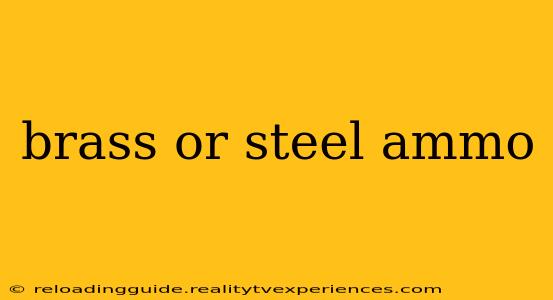Choosing the right ammunition is crucial for any firearm enthusiast, whether you're a seasoned marksman or a novice shooter. One of the most fundamental decisions involves selecting between brass and steel casings. This comprehensive guide delves into the key differences between brass and steel ammo, helping you make an informed choice based on your needs and budget.
Brass Ammo: The Traditional Choice
Brass ammunition has long been the standard in the shooting world, prized for its reliability and reusability. Let's explore its advantages and disadvantages:
Advantages of Brass Ammo:
- Reliability: Brass is significantly more durable and less prone to cracking or deformation under pressure. This translates to fewer malfunctions and greater reliability, particularly important in critical situations.
- Reusability: A major benefit of brass ammo is its reusability. Once fired, brass casings can be reloaded, saving you money in the long run. This is a significant factor for frequent shooters or those on a budget.
- Collectibility: Many shooters appreciate the aesthetic appeal and collectibility of brass casings. They can be kept as souvenirs or used for crafting projects.
- Consistent Performance: The consistent material properties of brass contribute to more consistent performance across different rounds.
Disadvantages of Brass Ammo:
- Cost: Brass ammo is generally more expensive than steel ammo due to the higher cost of materials and manufacturing.
- Weight: Brass is heavier than steel, meaning you'll carry more weight with the same amount of ammunition.
Steel Ammo: The Budget-Friendly Option
Steel ammo has gained popularity as a more affordable alternative to brass. However, it's crucial to understand its limitations:
Advantages of Steel Ammo:
- Cost: Steel ammo is significantly cheaper than brass ammo, making it an attractive option for high-volume shooters or those on a tighter budget.
- Weight: Steel is lighter than brass, reducing the overall weight carried.
Disadvantages of Steel Ammo:
- Reliability: Steel casings are more prone to cracking or deformation under pressure, potentially leading to malfunctions. This is particularly true with older or less-maintained firearms.
- Non-Reusability: Steel casings are generally not reloadable. The process of resizing and reforming steel is far more difficult and often damaging to the casing.
- Corrosion: Steel casings are susceptible to corrosion, especially in humid environments. Proper storage is essential to prevent damage.
- Compatibility: Steel ammo is not always compatible with all firearms. Some guns, particularly older models, may experience damage from steel casings. Always check your firearm's manual before using steel ammo.
Choosing the Right Ammo: Factors to Consider
The best choice between brass and steel ammo depends on several factors:
- Budget: If cost is a major concern, steel ammo is the more economical choice.
- Firearm: Check your firearm's manual to ensure compatibility with steel ammo. Using incompatible ammo can damage your weapon.
- Shooting Frequency: For frequent shooters who prioritize reliability and potential cost savings through reloading, brass is the better option.
- Intended Use: If reliability is paramount (e.g., self-defense), brass ammo is generally preferred. For target practice or plinking, steel might suffice.
- Environmental Conditions: If you shoot frequently in humid conditions, consider the increased risk of corrosion with steel ammo.
Conclusion: Making the Right Choice
Ultimately, the decision between brass and steel ammo depends on your individual needs and priorities. Carefully weigh the advantages and disadvantages of each, ensuring compatibility with your firearm and considering factors like budget, intended use, and environmental conditions. By understanding these key differences, you can make an informed decision that enhances your shooting experience and ensures the safety and longevity of your firearm.

